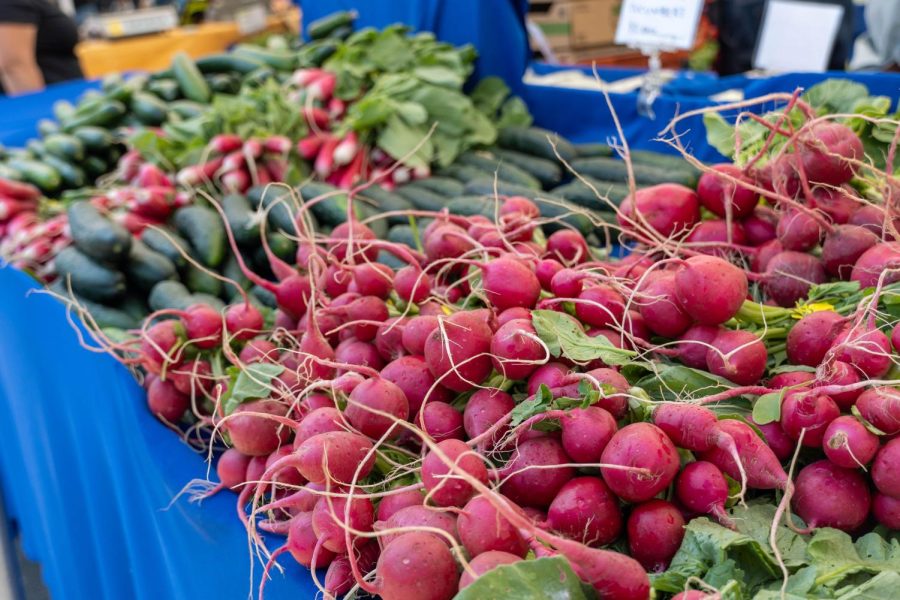Oregon State University to Co-lead New USDA Regional Food Business Center
A collection of radishes and cucumbers at the Corvallis farmers market on May 20 in downtown Corvallis. The business centers are intended to help small and mid-sized producers succeed in local and regional markets, according to Lauren Gwin.
June 5, 2023
The United States Department of Agriculture has selected Oregon State University and Colorado State University to co-lead the new Northwest and Rocky Mountain USDA Regional Food Business Center starting this July.
According to Sarah Masoni, director of product and process development at the OSU Food Innovation Center, this is one of 12 new USDA Regional Food Business Centers across the nation.
The business centers are intended to help small and mid-sized producers succeed in local and regional markets, according to Lauren Gwin, the interim director for the Center for Small Farms and Community Food Systems, part of the OSU College of Agriculture Extension program.
The center is not a new physical building, according to Masoni, but will be a collaboration between existing extension services across Oregon, Washington, Idaho, Montana, Wyoming and Colorado, and funded with 30 million dollars spread over the next five years, according to Gwin.
“When I knew that USDA was going to create this program … I called up my colleagues at Colorado State University and I said ‘I know you all are going to be able to lead one of these things because of what you do and I really want to be part of it’”, said Gwin. When applications were due CSU reached back to her and asked if OSU would be their co-lead.
OSU’s team will involve existing agriculture extension services including the Center for Small farms and Community Food Systems, the Food Innovation Center Agricultural Experiment Station, and the Niche Meat Processors Assistance Network. They will provide assistance to producers, processors and food businesses in underserved communities across the six-state region.
Rebecca Thistlethwaite, the director of NMPAN, said that the Food Business Center funding will help her program expand the technical assistance and educational support it provides to local meat processors. This will include additional training on marketing, food safety, techniques to scale up business, and waste management. NMPAN will also work with the National Intertribal Food Business Center, led by the Intertribal Agriculture Council, to create resources for meat processors in tribal communities.
“(The) USDA has been recognizing that small and mid-scale businesses, and farms, and local and regional supply chains and food economies are a really important part of food and agriculture,” says Gwin, “Finally, more resources are being dedicated to it, to folks who have been doing this work with, you know, toothpicks, chewing gum and baling twine, I like to say.”
Masoni said they will focus on helping entrepreneurs in the food business as they scale up production, and on coordinating food hubs across the region.
“What I really would love to see happening, is that in all rural communities, including tribal communities, that we would have food systems that would support the people that live there with foods that are local,” Masoni said.
She noted that the OSU’s Extension Services were already involved with small farms and food distribution in rural communities in Oregon, but that the Regional Food Business Center will facilitate collaboration with communities across all six states.
“If we really think deeply about it, maybe it’s a way to connect extension out into the community more closely with services that are provided,” said Masoni, “So it’s kind of connecting all the dots and making sure that we have the funding to do the work that we’re supposed to do.”



















































































![Newspaper clipping from February 25, 1970 in the Daily Barometer showing an article written by Bob Allen, past Barometer Editor. This article was written to spotlight both the student body’s lack of participation with student government at the time in conjunction with their class representatives response. [It’s important to note ASOSU was not structured identically to today’s standards, likely having a president on behalf of each class work together as one entity as opposed to one president representing all classes.]](https://dailybaro.orangemedianetwork.com/wp-content/uploads/2025/03/Screenshot-2025-03-12-1.00.42-PM-e1741811160853.png)























